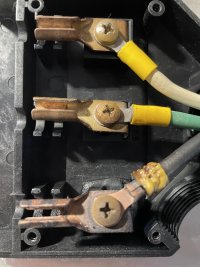rudylyon57
Well-Known Member
Fellow brewers- Has anyone using a Blichmann boil coil ever had issues with plug overheating & melting housing? I've had two 55 gallon size plugs overheat and melt plastic plug housing. Running on 208V so less current than rated 240V. Blichmann has replaced one under warranty but I'm doubtful the root cause problem has been addressed. Wire to terminal screws were loose on both burned legs but I don't know if that was the cause or effect from high resistance on posts. My plan is to open plugs and insure wire to terminal screws are tight and use electrically conductive grease on posts.



